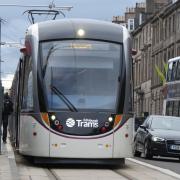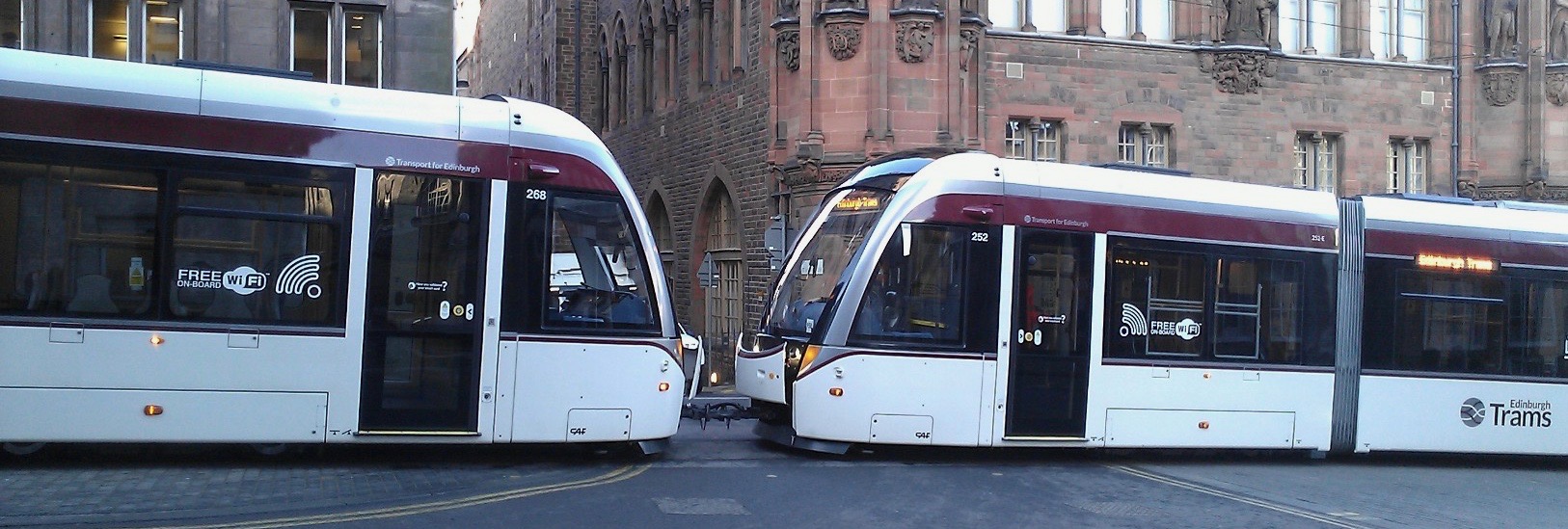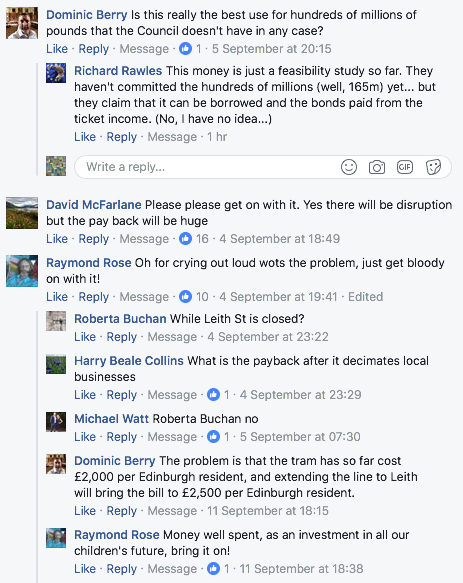
COUNCILLORS VOTE TO GO AHEAD, GAIN MORE INFORMATION, AND TAKE FINAL DECISION NEXT AUTUMN
Grave warnings about pressing ahead with the tram extension came from local figures addressing the Transport and Environment Committee this afternoon. The special meeting was considering the updated Outline Business Case (OBC) for extension, and looking for the best way to proceed.
You can read the meeting papers by following this link.
Leith Central Community Council
First came a deputation from Leith Central Community Council (LCCC). Vice-Chair Harald Tobermann, an experienced spokesperson on transport matters, said he was broadly in favour of trams as part of a modern mix of transport options, but there were three main areas he wanted councillors to address.
1. Leith Walk has seen continuous construction for over 10 years with very wearing effects on local residents.
2. Does the report and OBC take into account the effect of another 5 years’ work?
3. Have lessons really been learned when the conclusions of Lord Hardie's Trams Enquiry have not yet been reached let alone published?
Tobermann pointed out that, contrary to the Report’s description of the Leith Walk ‘corridor’, the 2011 Census 2011 paints it as having the highest employment rate and levels of educational qualifications in the city. Densely populated (with 30,000 residents), the area is already well served by public transport. Therefore eventual benefits here will be limited.
In Leith Walk, only 45% of households own cars – the rest rely on local shops, good pavements, and effective public transport.
It is unreasonable to expect locals to put up with further chaos, derelict pavements, and faded lines. Five more years of construction-related pollution, delays, and noise would have unquantifiable impacts on local people’s physical and mental health.
Tobermann went on to ask whether the Council’s services – such as waste collection, street cleaning, street lighting, and routine street maintenance – would be able to cope with the disruption and diversions resulting from construction.
He is certain that logistics for some of the 300 business (and an estimated 1,000 associated jobs) will be adversely affected, with some small businesses being forced to close.

How robust are the OBC’s assumptions? Tobermann says that by their very nature, assumptions carry risks which are hard to assess. ‘I would caution against undue optimism in the report by those in favour of the extension,’ particularly in the wake of Brexit which may deter forecast migration to the area over the next 30 years.
Tobermann suspects that the real reasons for extending trams according to the current projected schedule are:
1. Time is running out under provisions of the Tram Act. If deadline is missed, tram backers would need to go to Parliament again, with all the potential problems associated.
2. The existing tramline to York Place is financially unsustainable – it cannot wash its face. The extension is for the benefit of Edinburgh in general, not Leith in particular.
Tobermann had other areas of concern. Last time round, the contract was non-standard, leading to unresolvable disputes. This time, the projected contract would share the financial risks between Council and contractors. But can Edinburgh truly afford this?
And what about the complexity of underground services? There is little evidence, he says, to suggest these are truly understood, and the 1,000-plus potential conflicts identified in the Council's desktop exercise could just be the tip of the iceberg.
By Tobermann’s estimation, if the 150m stretch of Leith Street requires 44 weeks to re-engineer, the tram extension will take 5 years’ construction not the 3 years predicted in the Report.
In conclusion, Tobermann reiterated the Council’s duty to consider the health of local residents. He urged them not to rush into taking a decision.

Questions from councillors
LCCC was thanked for its detailed and thorough approach, before Tobermann and chair Charlotte Encombe took questions from councillors.
Cllrs Charles Booth Booth and Karen Doran both said their constituents (Leith and City Centre) were mostly pro-trams, and asked how thorough LCCC’s consultation with locals had been about the OBC. Tobermann said that the OBC had only been available for a week, so consultation had been minimal. However, the issues had been standing items on their agenda for 10 years, and most locals were fed up. He was not sure much support for the trams would continue during disruptive works. Encombe added that shopkeepers were already reporting serious downturns in footfall along Leith Walk.
Answering Cllr Barrie’s question about timing of any extension, Tobermann recommended delaying a decision for one or two months to make further enquiries and receive assurances. He called for compensatory measures for Leith Walk residents, such as more access to green space, improved details about compensation for businesses, and – in case of severe time overruns – possible Council Tax refunds.
He said serious consideration should be given to suspending Phase 6 of the Leith Walk Programme between McDonald Rd and Annandale Street for two years, giving local people some respite from the disturbance. Basic services such as waste collection and street lighting should be prioritised in the area to make it more bearable. Encombe added that enhanced parking controls on local side-streets should be introduced as a matter of urgency.

Cassandra, doom, gloom, bruises
After LCCC representatives had finished, City Centre Cllr Mowat addressed the committee. She based her warnings partly on her own experience as a then inexperienced councillor closely involved with the trams last time round.
If you approve, she told them, you move one step closer to letting the contract, and that is a hard train to get off. She believes the report underestimates the risks involved, and (echoing Tobermann) cannot possibly learn from Lord Hardie’s findings as they haven’t been published yet. She wondered whether the timescale for the process had actually been designed to avoid being derailed by Hardie’s findings. What if Hardie recommended that the Council should not be in touch of such a large infrastructural project?
Like the LCCC, Mowat was worried about the possible effects of Brexit. What would the effect be on the contract when not all the signatories were in EU member countries?
And how would reduction of congestion be achieved when most of the projected line travelled through an area where 55% of residents had no car? Would the promised modal shift simply be from bus to tram? Can Lothian Transport afford all this?
Mowat also raised doubts about how realistic the projected development benefits are.
Parts of Forth Ports’ docks are no longer available for housing since they have now been redeveloped for industry. Would optimistic accounting realistically open up areas of Granton and west of Newhaven?
Councillors were lied to by officers in the past, she concluded gloomily. Unless today’s councillors have absolute, rock-solid faith in their officers, they risk experiencing a most bruising experience if things start to go wrong again.

To cut a long story short
Much later, speakers for the various political parties summed up their positions. Below, we summarise.
The SNP and Labour Coalition accepted the recommendations of the Report and the Green and Lib Dem amendments. It’s a necessary and timely response to likely increase in Edinburgh’s population of 100,000 new residents by end of 2030s. The alternative is ‘grinding gridlock’ and economic damage. The models used so far have been robust and conservative, and the business case strongly shows it’s worth going forward at this stage to gather more information about long-term improvements for the city. The lack of concrete mitigation measures for Leith Walk business at this stage is simply a matter of timing. Firm pledges will be made later in the process.
The Conservatives’ amendment recommended taking no further action at this stage. The scheme, they said, carries unacceptable financial and reputational risks. Costs have been underestimated. Will badly affect Lothian Transport business, level of service, and staff prospects. Council officers and politicians lack sufficient experience to manage such a major project. Cumulative effect of St James Quarter work and tramworks has not been factored in. Need more detail. Need to wait for results of Edinburgh Tram Enquiry.
The Greens are in favour of this robust business case which has been the subject of considerable scrutiny. This is a timely investment in the city’s future. Going out to tender now is prudent, and will provide further detail on which an informed decision can be made in November 2018. Tackles pollution, congestion, and improves quality of life. Green amendment will strengthen joined-up, day-to-day consultation with cycling groups.
The Liberal Democrats' amendments were intended to help sell this project to doubting citizens of Edinburgh. Strengthens wording so that Lord Hardie’s findings will be taken into account. And if enquiry has not reported by next autumn, there will be a chance to decide whether or not to proceed.
The motion to proceed was carried by 8 votes to 3. If approved by Full Council later this month, officials will seek tenders and undertake further research before returning for a final red or green light decision in November 2018.
-----------
